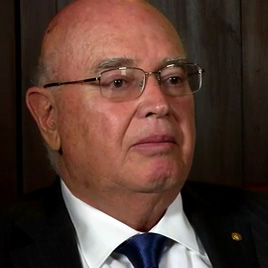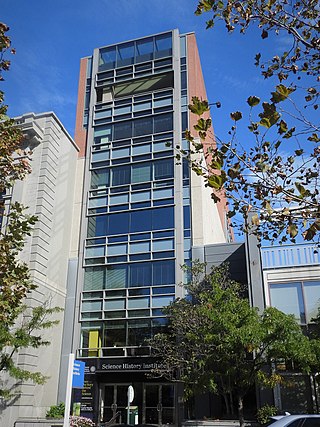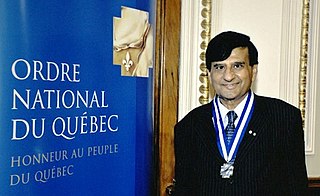Related Research Articles

The Royal Society of Chemistry (RSC) is a learned society in the United Kingdom with the goal of "advancing the chemical sciences". It was formed in 1980 from the amalgamation of the Chemical Society, the Royal Institute of Chemistry, the Faraday Society, and the Society for Analytical Chemistry with a new Royal Charter and the dual role of learned society and professional body. At its inception, the Society had a combined membership of 34,000 in the UK and a further 8,000 abroad. The headquarters of the Society are at Burlington House, Piccadilly, London. It also has offices in Thomas Graham House in Cambridge where RSC Publishing is based. The Society has offices in the United States, on the campuses of The University of Pennsylvania and Drexel University, at the University City Science Center in Philadelphia, Pennsylvania, in both Beijing and Shanghai, China and in Bangalore, India.

George Andrew Olah was a Hungarian-American chemist. His research involved the generation and reactivity of carbocations via superacids. For this research, Olah was awarded a Nobel Prize in Chemistry in 1994 "for his contribution to carbocation chemistry." He was also awarded the Priestley Medal, the highest honor granted by the American Chemical Society and F.A. Cotton Medal for Excellence in Chemical Research of the American Chemical Society in 1996.

Gabor A. Somorjai is a professor of chemistry at the University of California, Berkeley, and is a leading researcher in the field of surface chemistry and catalysis, especially the catalytic effects of metal surfaces on gas-phase reactions. For his contributions to the field, Somorjai won the Wolf Prize in Chemistry in 1998, the Linus Pauling Award in 2000, the National Medal of Science in 2002, the Priestley Medal in 2008, the 2010 BBVA Foundation Frontiers of Knowledge Award in Basic Science and the NAS Award in Chemical Sciences in 2013. In April 2015, Somorjai was awarded the American Chemical Society's William H. Nichols Medal.
Chartered Chemist (CChem) is a chartered status awarded by the Royal Society of Chemistry (RSC) in the United Kingdom, the Royal Australian Chemical Institute (RACI) in Australia, by the Ministry of Education in Italy, the Institute of Chemistry Ceylon (IChemC), Sri Lanka, and the Institute of Chartered Chemists of Nigeria in Nigeria.
Gilbert Stork was an organic chemist. For a quarter of a century he was the Eugene Higgins Professor of Chemistry Emeritus at Columbia University. He is known for making significant contributions to the total synthesis of natural products, including a lifelong fascination with the synthesis of quinine. In so doing he also made a number of contributions to mechanistic understanding of reactions, and performed pioneering work on enamine chemistry, leading to development of the Stork enamine alkylation. It is believed he was responsible for the first planned stereocontrolled synthesis as well as the first natural product to be synthesised with high stereoselectivity.
Marion Frederick Hawthorne was an inorganic chemist who made contributions to the chemistry of boron hydrides, especially their clusters.

George McClelland Whitesides is an American chemist and professor of chemistry at Harvard University. He is best known for his work in the areas of nuclear magnetic resonance spectroscopy, organometallic chemistry, molecular self-assembly, soft lithography, microfabrication, microfluidics, and nanotechnology. A prolific author and patent holder who has received many awards, he received the highest Hirsch index rating of all living chemists in 2011.

John Dombrowski Roberts was an American chemist. He made contributions to the integration of physical chemistry, spectroscopy, and organic chemistry for the understanding of chemical reaction rates. Another characteristic of Roberts' work was the early use of NMR, focusing on the concept of spin coupling.
Carl Shipp "Speed" Marvel was an American chemist who specialized in polymer chemistry. He made important contributions to U.S. synthetic rubber program during World War II, and later worked at developing polybenzimidazoles, temperature-resistant polymers that are used in the aerospace industry, in fire-fighting equipment, and as a replacement for asbestos. He has been described as "one of the world's outstanding organic chemists" and received numerous awards, including the 1956 Priestley Medal and the 1986 National Medal of Science, presented by President Ronald Reagan.

Chad Alexander Mirkin is an American chemist. He is the George B. Rathmann professor of chemistry, professor of medicine, professor of materials science and engineering, professor of biomedical engineering, and professor of chemical and biological engineering, and director of the International Institute for Nanotechnology and Center for Nanofabrication and Molecular Self-Assembly at Northwestern University.

Omar M. Yaghi is the James and Neeltje Tretter Chair Professor of Chemistry at the University of California, Berkeley, the Founding Director of the Berkeley Global Science Institute, and an elected member of the US National Academy of Sciences as well as the German National Academy of Sciences Leopoldina.

William Joseph Sparks was a chemist at Exxon. As an inventor, his most important contribution was the development of butyl rubber.

The Science History Institute is an institution that preserves and promotes understanding of the history of science. Located in Philadelphia, Pennsylvania, it includes a library, museum, archive, research center and conference center.

Ashok K. Vijh, is an Indian born Canadian chemist. He was born in Punjab but moved to Canada in 1962.

Cynthia "Cyndie" Anne Maryanoff is an American organic and materials chemist. Among other awards, she received the 2015 Perkin Medal for outstanding work in applied chemistry in the U.S.A.

The American Institute of Chemists Gold Medal is the highest award of the American Institute of Chemists and has been awarded since 1926.
Richard B. Kaner is an American synthetic inorganic chemist. He is a distinguished professor and the Dr. Myung Ki Hong Endowed Chair in Materials Innovation at the University of California, Los Angeles, where he holds a joint appointment in the Department of Chemistry and Biochemistry and the Department of Material Science and Engineering. Kaner conducts research on conductive polymers (polyaniline), superhard materials and carbon compounds, such as fullerenes and graphene.

The Charles Goodyear Medal is the highest honor conferred by the American Chemical Society, Rubber Division. Established in 1941, the award is named after Charles Goodyear, the discoverer of vulcanization, and consists of a gold medal, a framed certificate and prize money. The medal honors individuals for "outstanding invention, innovation, or development which has resulted in a significant change or contribution to the nature of the rubber industry". Awardees give a lecture at an ACS Rubber Division meeting, and publish a review of their work in the society's scientific journal Rubber Chemistry and Technology.

The Othmer Gold Medal recognizes outstanding individuals who contributed to progress in chemistry and science through their activities in areas including innovation, entrepreneurship, research, education, public understanding, legislation, and philanthropy. The medal is presented annually under the sponsorship of the Science History Institute and four affiliated organizations: the American Chemical Society (ACS), the American Institute of Chemical Engineers (AIChE), The Chemists' Club, and the American section of the Société de Chimie Industrielle, at the Science History Institute's Heritage Day.
The Chemical Pioneer Award, established in 1966, is awarded by the American Institute of Chemists to recognize chemists or chemical engineers who have made outstanding contributions to advances in chemistry or the chemical profession.
References
- ↑ "American Institute of Chemists - Home". Theaic.org. Archived from the original on 2014-01-06. Retrieved 2014-02-16.
- ↑ "Gold Medal Awards". American Institute of Chemists. Archived from the original on 7 September 2015. Retrieved 30 November 2015.
- ↑ "American Institute of Chemists Gold Medal". Science History Institute. March 22, 2018. Archived from the original on February 2, 2018. Retrieved March 23, 2018.
- ↑ "The Chemical Pioneer Award". American Institute of Chemists. Archived from the original on 5 September 2015. Retrieved 30 November 2015.
- ↑ "The Legendary Chemist, 'Gasoline Gus'". Archived from the original on 2016-09-23. Retrieved 2016-04-06.